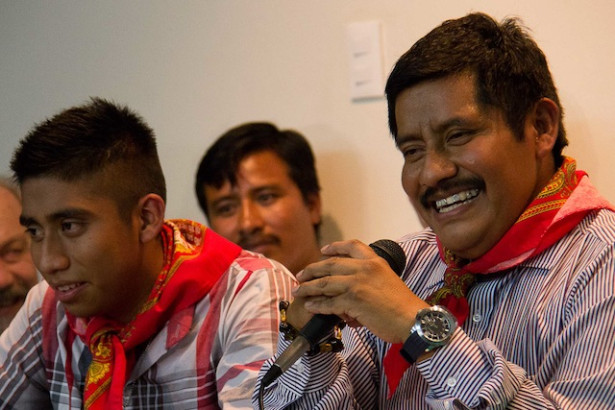
Por: Marta Molina (http://wagingnonviolence.org)
Alberto Patishtan (right) smiles after receiving a special pardon. He is accompanied by his son Hector (left) and Pedro Lopez (behind) who organized with Patishtan in prison and was freed this past summer. (WNV/Marta Molina)
After 13 years of unjust imprisonment, Mexican political prisoner Alberto Patishtan Gomez walked free on October 31.
Over the course of his incarceration, the 42-year-old indigenous Tzotzil professor grew into one of Mexico’s leading voices protesting the unjust imprisonment of indigenous peoples, a widespread problem in the country where racism and violence against the indigenous communities is still rampant. From behind bars, he organized for the liberation for many of his indigenous companions. His final victory now is his own freedom, although he often said that he has always felt free, even when imprisoned, because he knew he was innocent.
His first public appearance after gaining his freedom was not in his home state of Chiapas nor at the entrance of Prison Number 5 in the city of San Cristóbal de Las Casas, where he had been held. Instead, he was in Mexico City with his son Héctor, his daughter Gaby, and his niece Génesis. While still imprisoned, he had been transferred to Mexico City to receive treatment for the brain tumor that has been causing him to lose his vision.
“Who is Patishtan?” he asked in front of dozens of cameras angling for the best photo. “I am Patishtan,” he said, “a person who not only hears, but listens. Patishtan is someone who is losing his vision because of his sickness, which doesn’t let him see very well with his eyes, but I can see much more clearly in my heart.”
No one pardoned Patishtan
Supporters from across Mexico and from around the world have been organizing for Patishtan’s freedom ever since he was arrested and convicted of murdering Mexican police officers in a trial that was filled with flaws and corruption. Earlier this year, a Chiapas court denied his appeal, a significant setback in the case. His supporters then began to explore other possibilities, including a push for a amnesty or for release for humanitarian reasons due to his illness. But neither of those two possibilities moved forward.
Finally, the path to his freedom came not through the judicial system but through the legislative branch. On October 23, 2013, the senate modified the pardon rules in Mexico’s federal penal code. It became known as the “Patishtan Law,” and President Enrique Peña Nieto used it to grant him a “special pardon” — distinct from the standard “presidential pardon,” which would have left Patishtan free, but still guilty in the eyes of the law.
“No one pardoned Patishtan. The organized people achieved his freedom,” shouted activists upon seeing Patishtan finally free after 13 years of struggle.
In addition to achieving Patishtan’s freedom, the campaign represents a victory against the Mexican judicial system, which is now forced to recognize its error. “What is now being recognized is that Patishtan suffered grave human rights violations, violations of due process, and that his innocence was not presumed,” said Sandino Rivero, Patishtan’s lawyer.
To many who have been working for Patishtan’s freedom, the passage of this law is evidence of the widespread injustices in the Mexican legal system.
“This is a victory that resulted from the sad failure of Mexican justice,” said Patishtan’s 17-year-old son, Hector, who has grown into a human rights activist during his father’s incarceration and has vowed to continue fighting for the freedom of other political prisoners still behind bars.
Victories from behind bars
Early in his incarceration, Patishtan saw so many indigenous prisoners who did not know how to defend themselves, didn’t have money for lawyers, didn’t speak Spanish and didn’t have access to interpreters. He began organizing prisoners to fight for their basic rights and to prove their innocence.
At the first prison where he was held, everyone he organized with was freed, expect for himself. Later, when he was transferred to another prison, he organized an action to burn the prisoner uniforms, since the imposition of this clothing meant the further loss of one’s individuality and personality. He also proposed camping in the prison’s patio, and over the years many prisoners stopped sleeping in their cells and organized a permanent occupation of the patio. In some ways, these acts of resistance made them more free.
In 2006, when the Zapatistas launched “The Other Campaign” to unite with resistance movements across Mexico and in other regions, Patishtan and other prisoners decided to join the campaign. Through this broader network, the group was able to increase visibility about the injustices faced by indigenous political prisoners in Chiapas. Over the years Patishtan also organized a series of hunger strikes, which, despite his current illness, strengthened him physically and mentally. These strikes won freedom for many of his fellow prisoners, but it only brought him increased punishment. He was sent to a maximum security prison in the state of Sinaloa, thousands of miles away from his home state of Chiapas. There, for the first time, they cut his hair, which represented a loss of his indigenous identity. One’s hair acts as protection when working in the milpa, cornfield. Around that point, Patishtan also began to write letters to himself.
With the support of the People’s Movement in El Bosque for Patishtan’s Freedom and a number of human rights organizations, Patishtan was relocated to a prison in Chiapas after 10 months. There, after years of organizing, hunger strikes and outside campaigns, eight more of his companions were released. Once more, all of Patishtan’s companions were freed, except for himself and Alejandro Díaz Santís, who remains incarcerated to this day.
Organizing for many
Patishtan’s release is heralded as a victory for the millions of indigenous people in Mexico, who continue to face discrimination within the media and the judicial system. It is also an example of how to use one person’s struggle to organize for many, such as Patishtan’s companions Pedro López and Juan Collazo who were freed earlier this summer.
Upon hearing about Patishtan’s release, they said that he taught them how to read, write, speak Spanish — and, most importantly, how to organize. “For me, it opened a door to living when I met Alberto,” said Collazo. “I learned to defend my rights and teach others to do the same.”
Despite the freedom of their teacher, the two said that they will continue organizing.
“For Alejandro Díaz Santís, Miguel Demeza Jimenez, Antonio Estrada Estrada, and for all of the political prisoners in this country, we will continue fighting,” says Pedro Lopez.
This weekend, after finishing his medical treatment, Patishtan turned to his hometown, El Bosque, where he plans to continue organizing for the rights of poor and indigenous communities. In his eyes, the reverberation of his campaign is the most inspiring part of his own freedom.
“They wanted to stop my struggle, but what happened is it multiplied. They wanted to hide it, but they made it glow.”
Translated from the original Spanish by Lela Singh.
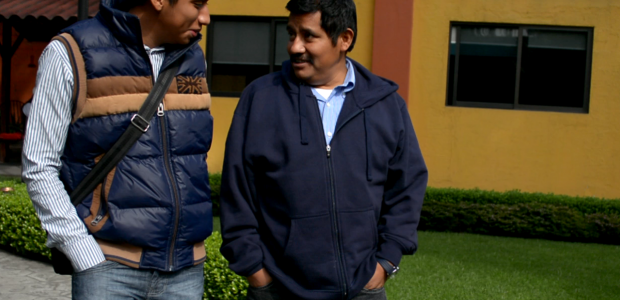

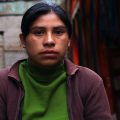
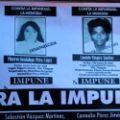
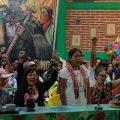
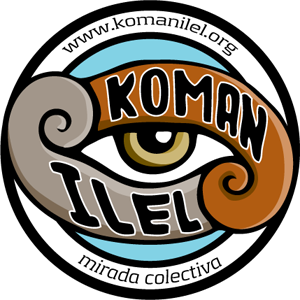
 Asesinan a defensor de derechos humanos
Asesinan a defensor de derechos humanos  Le 20 juin 2021. Il devait être 6h59 -
Le 20 juin 2021. Il devait être 6h59 -  Al Congreso Nacional Indígena Al Conce
Al Congreso Nacional Indígena Al Conce  Grupo de choque agrede ambientalistas q
Grupo de choque agrede ambientalistas q  San Pedro, Chenalhó, Chiapas, México,
San Pedro, Chenalhó, Chiapas, México,  Foto: @JacobGarcíaMagdalena Aldama, C
Foto: @JacobGarcíaMagdalena Aldama, C  A los ciudadanos A los ambientalistas
A los ciudadanos A los ambientalistas  Ocosingo, Chiapas a 13 de noviembre d
Ocosingo, Chiapas a 13 de noviembre d  Comité de Desplazados Forzados Interno
Comité de Desplazados Forzados Interno  13 de noviembre de 2020. Ejido Chamiza
13 de noviembre de 2020. Ejido Chamiza 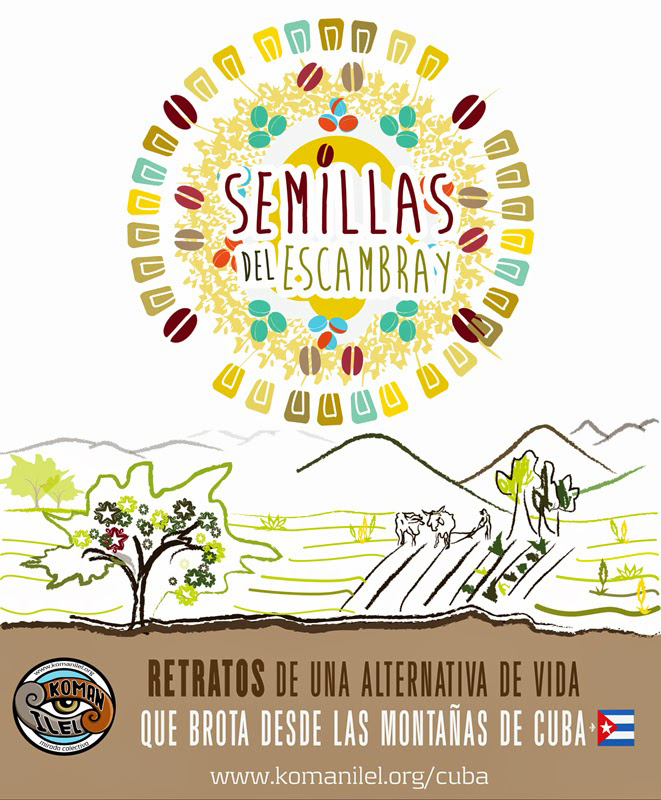
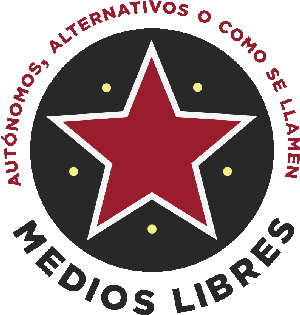

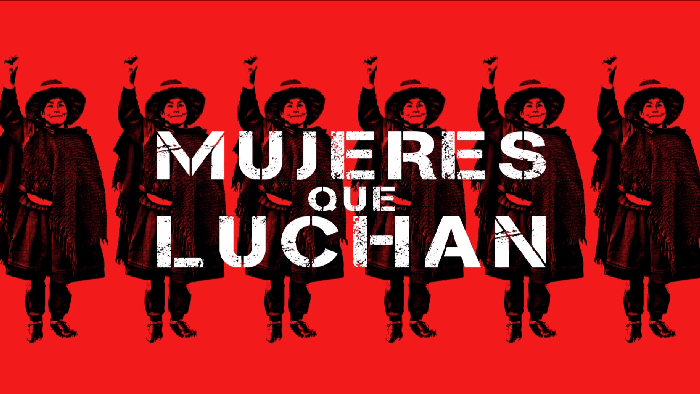

Deja un comentario